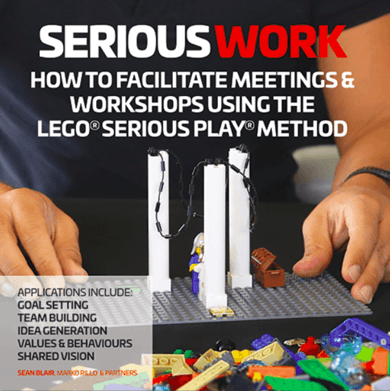Selling LSP
- This topic has 11 replies, 7 voices, and was last updated 10 years, 2 months ago by
Luc Cipers.
-
AuthorPosts
-
March 16, 2015 at 3:00 pm #4875
Luc Cipers
ParticipantDear colleagues,
The past 3 months I have been promoting LSP to my customers and prospects via meetings and 1 hour demo-workshops. I had some success, but not as much as I would have liked.
The feedback I receive most of the time is that
– they are interested and understand how the methodology could improve team building, but
– they don’t see how it could solve major strategic issues, and
– they’re not (yet) convinced top management would be ready to embrace what is perceived as a toyMy question: can you provide me with 1 or a couple business cases that could be an answer to the concerns? Also, would you have any other input that might help?
Thanks in advance,
LucMarch 16, 2015 at 4:18 pm #4876 BalintParticipant
BalintParticipantDear Luc!
I have the same problem time to time. What worked for me so far:
1. I always bring some pictures about a network, product development, where they can see the connections between the assets/ parts. What especially works is if you put these models onto a Business Model Canvas. Normally they know that, they see tons of connections (aka huge mess)…etc, so they can imagine how complex the method can be, that they can build a network, decision tree…etc. And it’s BMC (woow :)
2. Personal experiances: if you say “I did that…This or that way”. It’s much better than show random cases. Especially if you propose a problem and the way u solved it. Even if it’s some small personal matter.
3. Bring bricks: some connection material + pre-built models or a start kit… You prepare a 1minute pitch…etc.
Where I stuck: some client asked for “proof”. Like numbers. If XY company made ZY hours with LEGO, how much was the return, how much faster was the problem solving period…etc. Overall: if they use LSP, how much money will they earn/save.
Does anyone have proof, numbers, research for this part? Something what can convince math- science related people, CEEuropean businesses? Thx!
March 16, 2015 at 5:17 pm #4878 Eli De FriendMember
Eli De FriendMemberGuys don’t fall into the numbers trap! What about keeping the company in business, rather than going bankrupt? What about creating a context in which products are developed more efficiently? Having a more efficient R & D department might not affect your bottom line in the short term, but may help your organisation to develop products and services that do. Creating a better working environment for staff may mean less attrition of key people to the competition.
And in any case, even if you perform a benchmark before running your LSP activities, you can’t be sure to what extent the subsequent results (positive or negative) have been triggered by the LSP workshops.
If you come to a fork in a road and both options lead you to the destination. “You take the high road and I’ll take the low road and I’ll be in Scotland before ye”. Well even if you do arrive in Scotland before your buddy, to what extent was it due to taking the low road? I was on a global multi-year programme for a multinational that cost billions of dollars. Before they started they set an objective to reduce the cost of IT from 4% to 2% of overall turnover. However the programme didn’t even save money itself, it simply paved the way for other programmes that would save money. The shareholders and the financial markets accepted this. They understood that strategic programmes don’t necessarily have a direct and immediate impact on profit.
As I have written on this site on many an occasion, I don’t sell LSP. I sell services and once the contract is signed, I suggest using LSP. It has worked for me so far.
March 16, 2015 at 5:51 pm #4879 BalintParticipant
BalintParticipantEli, I understand what you say and I agree with it 100%, but sadly the market in Eastern Europe ask for exact numbers (most of the time). Thinking in short term, profit maximalization, cutting spending wherever they can, almost 0 imagination, employees don’t matter, 0time for LEGO. It’s crazy… The tendency is getting better. In numbers: 1st year doctor salary=~400-600 EUR, minimum salary=300 EUR, average=4-500EUR. TO rent a room= 150 EUR. You can imagine how easy to find someone else if employee no1. doesn’t fit to the job… :/
That’s why a study can be a big help, which shows (to which I can refer), that “We used LSP for 2 years now, we reached this/that/those in numbers”. This can be employee satisfaction, time reduction of problem solving… basically anything, just in numbers. This way I can reach (skeptical) companies easier.
I don’t know if these numbers/ studies exists, but definitely can help promoting the method in Central and East Europe in my opinion.
March 16, 2015 at 5:56 pm #4880 GabrielParticipant
GabrielParticipantI cold heartedly agree with Eli, don’t “fall into the numbers trap”. The way I work around this is by bringing up all the workshops I have conducted in the past, with or without LSP. LSP is a tool, and a great one… but the secret is the facilitator. Also depending on the type of clients you are dealing with, I learned so far that some will catch on really quickly and others, well, not so quickly. The latter are bogged down by numbers to justify their insecurities vis-à-vis LSP. In those particular cases, I try and show the impact through concrete examples.
My two cents worth…
March 16, 2015 at 6:07 pm #4882Luc Cipers
ParticipantI haven’t done any LSP workshops (certified in dec ’14), so I cannot refer to those… Numbers can help, but I would already be grateful to have one or couple business cases in which C-level decision makers used the method successfully to decide on strategic topics.
March 16, 2015 at 6:35 pm #4884 Eli De FriendMember
Eli De FriendMemberLuc, I find terms like C-level quite confusing; still here’s a list of CAPRESE LSP references, where senior management have been involved (I’ll leave it to you to decide whether VP R&D EMEA in Honeywell ACS who reports to an Executive VP is senior or junior to VP R&D Aerolia who reports directly to a CEO).
http://caprese.org/EN/experience/Exp_Case_Swisscom_EN.html
http://caprese.org/EN/experience/Exp_Case_Honeywell_EN.html
http://caprese.org/EN/experience/Exp_Case_UNDP_EN.html
http://caprese.org/EN/experience/Exp_Case_Aerolia_EN.html
http://caprese.org/EN/experience/Exp_Case_Itecor_EN.html
http://caprese.org/EN/experience/Exp_Case_EHL_EN.htmlLSP-Powered Stakeholder Consultation Workshop on Energy Efficiency Policy in Indonesia
http://caprese.org/EN/experience/Exp_Case_CWGER_EN.htmlRecently, I have done workshops with the Marketing Department of PwC Switzerland and Senior Management of African Tax Authorities and Academic Institutions, but haven’t yet written up the Case Studies.
Hope this helps,
Eli
March 16, 2015 at 7:18 pm #4893 Eli De FriendMember
Eli De FriendMemberBalint, I think we all understand the challenge; we have all met people who are shortsighted and don’t want to invest. Believe me, Eastern Europe does not have a monopoly on shortsightedness. Wall Street in New York has proven time and again that it cannot see beyond the end of its next 3-month nose. So these are the people whose careers are going to end in dust – don’t waste your time with them. But remember, as Gabriel says, LSP is just a tool. We can argue about which would be the best tool to tighten the spark plug of your Ferrari, but the question is whether or not you want to invest in fixing your Ferrari. LSP or spreadsheets, World Café or Powerpoint, the question still remains whether an entrepreneur wants his or her company to be still making profit in 5 years time or not. If the company is doing really well, without a strategy, it’s going to be a tough sell and personally I would just walk away from someone like that. Build up your credibility with the organisations who are prepared to invest in the future. They may not have as much ready cash right now, but they are perhaps more likely to be a household name ten years down the road. And their Ferrari will still be on that road, irrespective of the tool they finally chose to use to fix the spark plug.
March 16, 2015 at 11:46 pm #4894 Michael FearneMember
Michael FearneMemberHi Luc,
The good news is you’re getting meetings, you’re doing demo’s and they are understanding and seeing value in the method… up to a point.
From what you said the real problem is taking that next step and showing how it can solve major strategic issues. If you can show that, then the other issue of the method being perceived as a toy should melt away.
Is one option to do a 1/2 day or full day with a group that is just below this “top management”. Prove the method with this group, addressing a major strategic issue they are facing. It’s “safer” for the client and allows them to see the value and overcome the reservations they have about bringing it to top management.
On the other hand, sometimes you just need to cut your loses with clients. Some clients are just not ready and perhaps never will be. Trying to force through a solution doesn’t really lead to long term productive partnerships.
The judgement on when to push and when to put your energy into other clients is a defining one in business.
Hope that helps.
Michael
March 19, 2015 at 9:25 am #4908 @SeanBlairMember
@SeanBlairMemberHi Luc
Just a quick comment from me. People don’t want LSP.
They also don’t want a meeting, workshop or awayday.
They want an outcome.
Focus discussion on understanding the outcome they desire, then once thats clear establish what tools, methods or processes are suitable for helping them get the outcome they desire.
I find people seem to value this approach.
Best of luck!
Kindly
Sean
-
AuthorPosts
- You must be logged in to reply to this topic.

 Become a LEGO Serious Play facilitator - check one of the upcoming training events!
Become a LEGO Serious Play facilitator - check one of the upcoming training events!